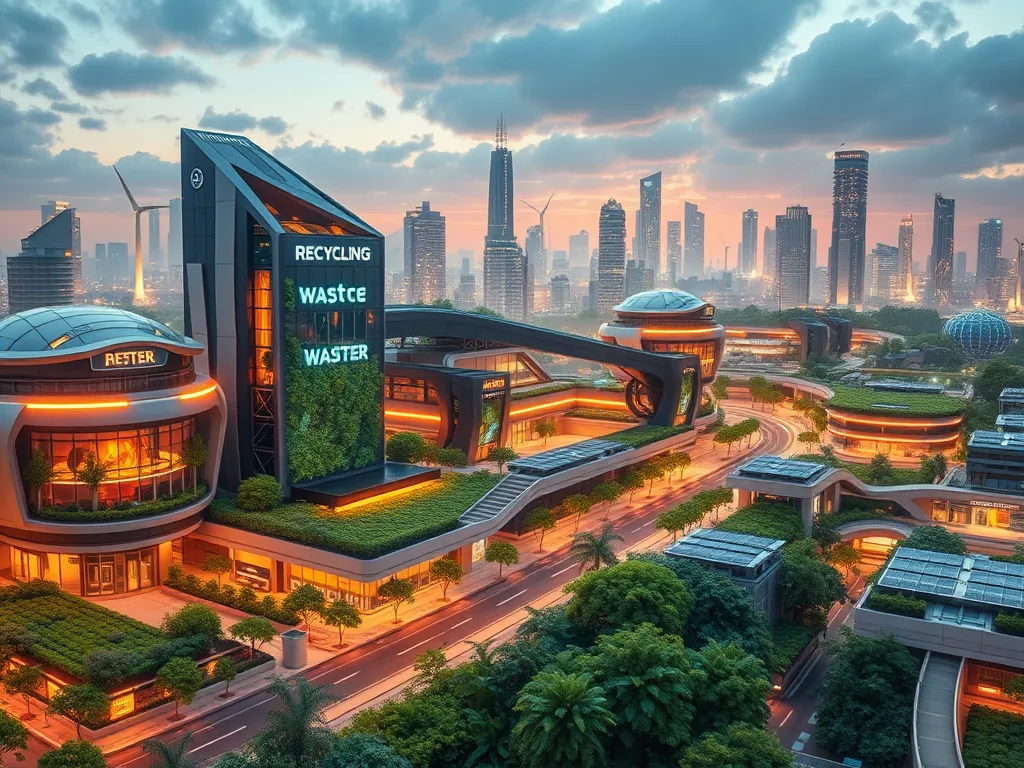Innovative Advances in Future Waste Management Strategies

Future Waste Management: Innovating for a Sustainable Tomorrow
Future waste management is a critical aspect of ensuring environmental sustainability and tackling the pressing challenges of waste generation and disposal in an ever-evolving world. With rapid urbanization, population growth, and increased consumerism, effective waste management strategies are essential to minimize the environmental impact of waste. As we look towards the future, innovative technologies and sustainable practices will play a pivotal role in shaping waste management systems.
The journey towards future waste management will involve a multifaceted approach combining technological advancements, sustainable practices, and public engagement. Smart cities are likely to become the norm, where waste management is seamlessly integrated into urban planning. Utilizing technology not only enhances operational efficiency but also encourages responsible waste disposal among residents. By incorporating cutting-edge solutions, such as artificial intelligence, the future of waste management can be both efficient and environmentally friendly.
To achieve effective future waste management, there will be an increasing focus on the reduction of waste at the source. This includes encouraging the use of biodegradable materials and implementing a circular economy model that emphasizes resource recovery and recycling. The future waste management landscape will require collaboration between governments, businesses, and communities to foster innovation and ensure that sustainable practices are adopted everywhere. The role of legislation and public awareness in this context cannot be underestimated, as they will drive the change needed to address waste issues effectively.
As we envision the future of waste management, the importance of educating the public on waste-related issues, such as recycling and composting, will become paramount. Creating a culture of sustainability will not only help in reducing waste but also empower individuals to take responsibility for their impact on the environment. We must prioritize community engagement and awareness campaigns as integral components of future waste management strategies.
In conclusion, the future of waste management rests on our ability to innovate and adapt to the challenges posed by waste generation. By embracing technology, sustainability, and education, we can pave the way for a cleaner, healthier planet for generations to come.
Technological Innovations in Waste Management
Smart waste bins equipped with sensors that monitor waste levels in real time can revolutionize waste collection processes. By optimizing routes for waste collection trucks based on data collected from these bins, cities can reduce fuel consumption and emissions while improving efficiency in waste collection, making it possible to send out trucks only when necessary.
AI and machine learning can enhance waste sorting processes, streamlining recycling efforts. By utilizing advanced algorithms, systems can automatically identify materials and classify them for proper disposal or recycling, minimizing contamination in recycling streams and increasing overall recycling rates significantly.
Addressing the evolving landscape of waste management requires innovative strategies, as outlined in this insightful article on the future of waste management challenges and solutions: https://green.org/2024/01/30/the-future-of-waste-management-challenges-and-solutions/
Biodegradable materials are an important aspect of future waste management. These materials can break down naturally over time, reducing the burden on landfills. Ongoing research examines the effectiveness of various biodegradable materials and their suitability for different applications, leading to a future where waste is minimized and natural degradation is maximized.
Waste-to-energy conversion technologies hold great promise for future waste management by transforming non-recyclable waste into usable energy. This not only reduces the volume of waste sent to landfills but also creates a sustainable source of energy that can power homes and industries, thus contributing to a circular economy.
Sustainable Practices for Waste Reduction
Adopting a zero waste lifestyle emphasizes the importance of reducing waste generation at the very outset. This approach encourages individuals to rethink their consumption patterns and emphasizes reusing and recycling items rather than discarding them. Several communities have successfully implemented zero waste initiatives that serve as models for others.
The circular economy model focuses on keeping resources in use for as long as possible while minimizing waste. This system reimagines the traditional linear economy by promoting the continuous use of materials, thereby reducing the demand for new resources and minimizing environmental impact. Through initiatives such as product redesign and take-back schemes, the circular economy aims to create a sustainable flow of materials.
Composting is a sustainable practice that significantly reduces organic waste sent to landfills by converting it into nutrient-rich soil. This process benefits both the environment and agriculture, as compost enriches the soil and promotes healthy plant growth. Educational campaigns and community composting programs can further encourage participation and awareness about the benefits of composting.
Community recycling programs are vital in promoting sustainable practices and reducing waste. By organizing local recycling drives and providing accessible recycling facilities, municipalities can empower residents to participate in waste reduction efforts actively. These programs not only increase recycling rates but also foster a sense of community responsibility towards waste management.
Government Policies and Regulations
Legislation plays a crucial role in shaping future waste management practices. Governments implementing robust waste management policies and regulations can incentivize waste reduction and promote recycling initiatives, creating a framework for sustainable waste management at the national and local levels. Examples include waste reduction targets and penalties for non-compliance.
Recycling mandates set by governments can increase recycling rates significantly by requiring businesses and households to separate recyclable materials from regular waste. Such mandates create a culture of recycling that encourages compliance and fosters innovation in recycling technologies, driving future advancements in waste management practices.
Incentives for sustainable practices can include tax breaks, grants, and funding for innovative waste management solutions. By providing financial support for businesses that adopt eco-friendly practices and technologies, governments can stimulate a shift towards sustainable waste management and resource conservation methods.
International agreements on waste reduction, such as the Basel Convention, aim to minimize hazardous waste transport and promote environmentally sound waste management practices worldwide. Collaboration at an international level is crucial for addressing global waste challenges and creating unified strategies for a sustainable future.
Public Awareness and Education
Education on waste management is essential for creating an informed populace that understands the significance of reducing waste and incorporating sustainable practices into daily life. Integrating waste management education into school curriculums can help instill these values in the next generation, ensuring long-term commitment to sustainability.
Campaigns aimed at reducing plastic usage have gained momentum globally, as societies become more aware of the detrimental effects of plastic pollution. These initiatives often involve promoting alternatives to plastic, encouraging consumers to choose reusable options and educate them about the consequences of plastic waste.
The role of schools in promoting sustainability cannot be underestimated. By engaging students in hands-on recycling projects, gardening, and composting, educators can develop a sense of environmental stewardship among youth. Schools can serve as models for sustainable practices that inspire students to engage with their communities positively.
Community engagement in waste reduction can take many forms, including organizing clean-up events, workshops, and awareness campaigns. When individuals feel empowered and connected to their communities, they are more likely to take an active role in reducing waste, ultimately contributing to the overarching goals of future waste management initiatives.
Future Trends in Waste Management
Emerging technologies will continue to shape the future of waste management. Innovations such as drone-assisted waste collection, advanced recycling systems, and smart city infrastructure inputs can greatly enhance waste management operations, ensuring a more efficient and sustainable approach to waste disposal.
Predicted changes in waste generation include increased waste due to economic growth and consumerism. However, with advancements in waste management practices and sustainable behavior, there is potential to mitigate this growth through improved resource recovery and waste processing techniques.
The role of social media in awareness is expanding, providing a platform for educating the public about waste reduction strategies and sharing success stories. Social media campaigns can mobilize communities and cultivate a wider audience involved in waste reduction efforts.
Collaborative efforts across industries will be essential in advancing sustainable waste management. By fostering partnerships between governments, private sector stakeholders, NGOs, and communities, we can create innovative solutions that lead to effective waste management practices for a sustainable future.
